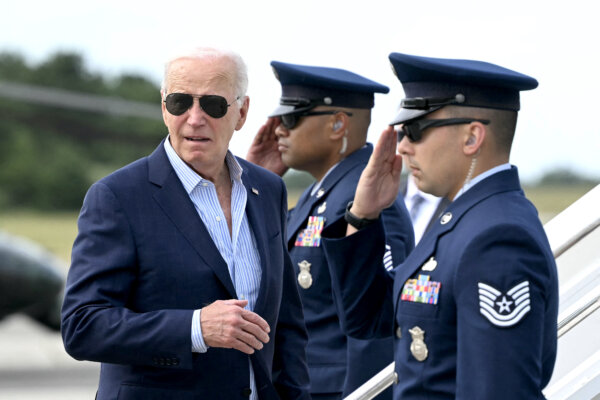
New measures target extreme heat as well as flooding and storms.
President Joe Biden spoke to the nation from the Emergency Operations Center in Washington, on July 2, and announced five new actions to “address extreme weather, including heat and other hazards.”
“Extreme weather events don’t just affect people’s lives, they also cost money,” he said. “They hurt the economy, and they have a significant negative psychological effect on people.
“Last year, the largest weather related disasters cost over—get this—$90 billion in damages in America.”
Calling attention to the “nearly 2.5 million people” displaced in 2023 due to weather-related disasters, the president emphasized the threat extreme weather poses to transportation systems, power grids, farms, fisheries, and forests.
Extreme Heat
President Biden said the Department of Labor is proposing a new rule that, once finalized, will “establish the nation’s first-ever federal safety standard for excessive heat in the workplace.” He said it would reduce heat injuries, illnesses, and deaths for more than 36 million in the workforce, including workers in the construction, postal, and manufacturing sectors.
The proposed rule would require employers to identify heat hazards, develop emergency response plans related to conditions affecting the head, and provide training to employees and supervisors on the signs and symptoms of heat-related illnesses. Employers would also be required to create rest breaks, provide shade and water, and allow new workers to acclimatize themselves to the heat.
“Already, tens of millions of Americans are under heat warnings from record shattering temperatures,” President Biden said. “Last month here in DC, the temperature went to 100 degrees; In Phoenix, Arizona, 112 degrees; In Las Vegas, 111 degrees. Above normal temperatures also are expected for much of the country in July, especially in central and eastern United States.”
He said his administration would convene the first ever “White House Summer on extreme heat” to bring together state, local, tribal, and territorial leaders, as well as international partners in an effort to protect communities and workers from extreme weather.
New FEMA, EPA Actions
Aside from the heat, the president called out other types of extreme weather, such as Hurricane Beryl, currently in the southern Caribbean, saying it was “the earliest time ever a dangerous category five hurricane has been recorded in American history.”
He announced two new actions involving FEMA. Once finalized, a new rule will require FEMA to factor the effects of future flooding into every federally funded construction project.
FEMA is also announcing nearly $1 billion in grants for more than 650 projects nationwide intended to help communities protect against natural disasters such as extreme heat, storms, and flooding.
President Biden emphasized these grants would advance his “Justice 40 Initiative,” which aims to deliver 40 percent of overall benefits, such as clean transit, clean energy, and climate investments, to “the poor communities always left behind.”
In addition, he announced that the Environmental Protection Agency (EPA) would be releasing a new report showing continued impacts of climate change on the environment and the health of the American people.










